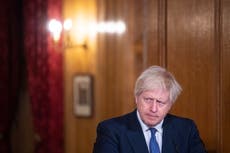Children’s commissioner calls for universal credit uplift for pandemic to be extended
‘It has had an important impact and that needs to continue,’ Anne Longfield says
Your support helps us to tell the story
From reproductive rights to climate change to Big Tech, The Independent is on the ground when the story is developing. Whether it's investigating the financials of Elon Musk's pro-Trump PAC or producing our latest documentary, 'The A Word', which shines a light on the American women fighting for reproductive rights, we know how important it is to parse out the facts from the messaging.
At such a critical moment in US history, we need reporters on the ground. Your donation allows us to keep sending journalists to speak to both sides of the story.
The Independent is trusted by Americans across the entire political spectrum. And unlike many other quality news outlets, we choose not to lock Americans out of our reporting and analysis with paywalls. We believe quality journalism should be available to everyone, paid for by those who can afford it.
Your support makes all the difference.The children’s commissioner has called for the £20-a-week uplift to universal credit to be extended, saying it “isn’t the time” for families to experience a fall in income.
The increase to weekly payments was introduced last April to provide extra support during the coronavirus pandemic, and is set to end on 31 March.
When asked about the uplift, Anne Longfield, the children’s commissioner for England, said: “I think it does need to be extended.”
“It has had an important impact and that needs to continue,” she told Sky’s Sophy Ridge on Sunday.
“This isn’t the time for families to have that uncertainty or that drop in income.”
Earlier this week, MPs warned the uplift had to be extended by another year “at the very least” to prevent hundreds of thousands of households from being “plunged into poverty”.
Nearly 700,000 people in the UK have fallen into poverty during the Covid-19 outbreak, analysis from a think tank revealed last year. It added that the figure could have been double were it not for the increase to universal credit.
On Sunday, Ms Longfield said very young children were “bearing some of the brunt” of an increase in poverty.
“If you fall behind before you get to school, you have very few chances to catch up during your school day,” she said. “The impact of those early years can have a huge impact on a child’s life throughout.”
The Trussell Trust, Britain’s biggest food bank network, also found more than 2,500 food parcels were handed out to children every day between April and September last year – more than double the same period in 2019.
Ms Longfield has previously told The Independent she wanted to see the £20-a-week universal credit uplift extended past April.
The Department for Work and Pensions has been approached for comment.
The commissioner also warned that some children may never be able to catch up on lost school time during the pandemic without the right support.
The government is said to be considering a number of options – including summer schools, extended school days and shorter summer holidays – as part of catch-up plans for pupils who have missed out on learning due to Covid-19.
Ms Longfield said she supported these proposals, and told Sky News: “Part of that really needs to be as well about helping children to build back those social skills and that confidence.
“There’s a group of children who won’t make up the time they’ve lost, these are the ones who started behind, who are struggling. Potentially about one in six children, if they don’t get that level of support and boost, won’t ever catch up during their time at school.”
The new education recovery tsar said teachers will be asked to increase learning time in light of disruption, suggesting school days or terms may be extended when classrooms reopen to all.
Speaking to the BBC earlier this week, Sir Kevan Collins said it was important to think about other areas beyond just academic study where children have lost out on due to the pandemic.
“I think we need to think about the extra hours not only for learning, but for children to be together, to play, to engage in competitive sport, for music, for drama because these are critical areas which have been missed in their development,” he said.
Meanwhile, child psychologists have urged the government to let young people play with friends this summer for their mental health instead of doing extra lessons.
Additional reporting by Press Association







Join our commenting forum
Join thought-provoking conversations, follow other Independent readers and see their replies
Comments